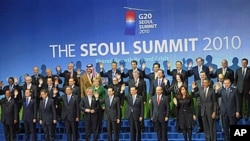World leaders at the G20 summit in Seoul addressed some of the major concerns of Asian leaders and market watchers by discouraging currency market intervention. And they promised coordinated efforts to avoid economic imbalances.
The G20 leaders agreed to pursue market-driven currencies, and to draw up guidelines on trade imbalances that would be used to check too large deficits or surpluses. The statement at the end of their summit Friday appears to reflect an agenda U.S. Treasury Secretary Timothy Geithner endorsed before the G20 last month.
Stephen Schwartz, an economist at the Spanish investment bank BBVA in Hong Kong, calls the agreement a positive outcome for the talks.
"It should help ease some of the recent rhetoric and tensions over currency issues and imbalances for a little while. I stress a little while because as long as we have this very unbalanced global recovery we are going to get periodic tensions in policy setting," Schwartz said.
China has come under fire from some of its trading partners, which say it keeps its currency artificially weak and creates unsustainable trade imbalances. On the other hand, in recent days the United States faced international complaints that the Federal Reserve's $600 billion stimulus plan will weaken the dollar.
|
US President Barack Obama, G20 statement:
|
President Barack Obama said Friday the yuan's exchange rate is an irritant in China's relations with its trading partners, and that the yuan is kept undervalued.
"So what this communiqué communicates not just to China but to all of us is letting currencies reflect market fundamentals, allowing your currency to move up and down according to the role that you're playing in the international trading system, is the best way to assure that everybody benefits from trade rather than just some," he said.
But he added that he expects China to make progress on the yuan issue.
Some Asian leaders and economists are concerned that the Federal Reserve's plan to buy back U.S. bonds will send a flood of cheap dollars into Asia. They fear that will cause prices in the region to rise rapidly, forming asset bubbles that could collapse and cause another financial crisis.
Earlier Friday, Hong Kong's leader Donald Tsang warned of such a boomerang effect.
"When you do something excessive to yourself to remedy a big hole, you'll find out that it will leak out and go up like a sharp weapon and injuring other neighboring partners and coming back to hit you," he said. "Like the United States for the time being."
The G20 statement Friday also agreed to let emerging economies with adequate reserves and overvalued currencies to adopt "macro prudential" measures. This is seen as referring to countries like Brazil, which have been trying to stem the flow of capital into their economies.
Schwartz says this does not necessarily mean capital control.
"Macro-prudential are more designed to eliminate scope for speculating against currencies and also protecting asset prices from bubbles. It's specific to both the type of measure, it referred to carefully designed macro measures," he explains. "And it's also quite specific on which type of countries, countries with increasingly overvalued exchange rates."
Major Asian stock markets tumbled Friday because of fresh troubles in Europe - this time on fears that Ireland may need a bailout because of its large deficit. Investors were also worried that China would further tighten money supply after inflation rose to its highest level in two years.
Shanghai's composite index dropped more than five percent. The Hang Seng index in Hong Kong fell nearly two percent and Japan's Nikkei 225 Average index fell more than one percent.













